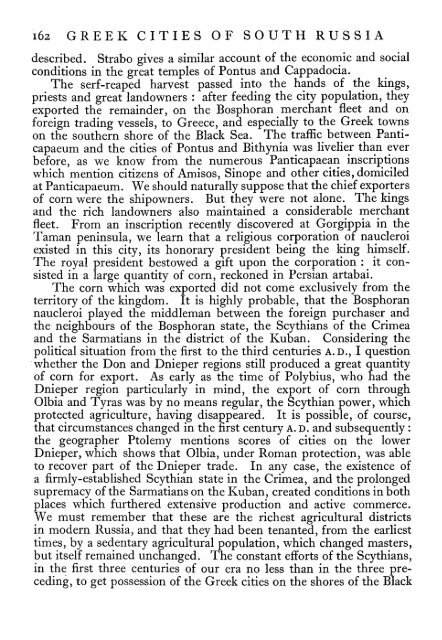Iranians and Greeks in South Russia - Robert Bedrosian's Armenian ...
Iranians and Greeks in South Russia - Robert Bedrosian's Armenian ...
Iranians and Greeks in South Russia - Robert Bedrosian's Armenian ...
You also want an ePaper? Increase the reach of your titles
YUMPU automatically turns print PDFs into web optimized ePapers that Google loves.
i62 GREEK CITIES OF SOUTH RUSSIA<br />
described. Strabo gives a similar account of the economic <strong>and</strong> social<br />
conditions <strong>in</strong> the great temples of Pontus <strong>and</strong> Cappadocia.<br />
The serf-reaped harvest passed <strong>in</strong>to the h<strong>and</strong>s of the k<strong>in</strong>gs,<br />
priests <strong>and</strong> great l<strong>and</strong>owners : after feed<strong>in</strong>g the city population, they<br />
exported the rema<strong>in</strong>der, on the Bosphoran merchant fleet <strong>and</strong> on<br />
foreign trad<strong>in</strong>g vessels, to Greece, <strong>and</strong> especially to the Greek towns<br />
on the southern shore of the Black Sea. The traffic between Panticapaeum<br />
<strong>and</strong> the cities of Pontus <strong>and</strong> Bithynia was livelier than ever<br />
before, as we know from the numerous Panticapaean <strong>in</strong>scriptions<br />
which mention citizens of Amisos, S<strong>in</strong>ope <strong>and</strong> other cities, domiciled<br />
at Panticapaeum. We should naturally suppose that the chief exporters<br />
of corn were the shipowners. But they were not alone. The k<strong>in</strong>gs<br />
<strong>and</strong> the rich l<strong>and</strong>owners also ma<strong>in</strong>ta<strong>in</strong>ed a considerable merchant<br />
fleet. From an <strong>in</strong>scription recently discovered at Gorgippia <strong>in</strong> the<br />
Taman pen<strong>in</strong>sula, we learn that a religious corporation of naucleroi<br />
existed <strong>in</strong> this city, its honorary president be<strong>in</strong>g the k<strong>in</strong>g himself.<br />
The royal president bestowed a gift upon the corporation : it consisted<br />
<strong>in</strong> a large quantity of corn, reckoned <strong>in</strong> Persian artabai.<br />
The corn which was exported did not come exclusively from the<br />
territory of the k<strong>in</strong>gdom. It is highly probable, that the Bosphoran<br />
naucleroi played the middleman between the foreign purchaser <strong>and</strong><br />
the neighbours of the Bosphoran state, the Scythians of the Crimea<br />
<strong>and</strong> the Sarmatians <strong>in</strong> the district of the Kuban. Consider<strong>in</strong>g the<br />
political situation from the first to the third centuries A.D., I question<br />
whether the Don <strong>and</strong> Dnieper regions still produced a great quantity<br />
of corn for export. As early as the time of Polybius, who had the<br />
Dnieper region particularly <strong>in</strong> m<strong>in</strong>d, the export of corn through<br />
Olbia <strong>and</strong> Tyras was by no means regular, the Scythian power, which<br />
protected agriculture, hav<strong>in</strong>g disappeared. It is possible, of course,<br />
that circumstances changed <strong>in</strong> the first century A. d. <strong>and</strong> subsequently :<br />
the geographer Ptolemy mentions scores of cities on the lower<br />
Dnieper, which shows that Olbia, under Roman protection, was able<br />
to recover part of the Dnieper trade. In any case, the existence of<br />
a firmly-established Scythian state <strong>in</strong> the Crimea, <strong>and</strong> the prolonged<br />
supremacy of the Sarmatians on the Kuban, created conditions <strong>in</strong> both<br />
places which furthered extensive production <strong>and</strong> active commerce.<br />
We must remember that these are the richest agricultural districts<br />
<strong>in</strong> modern <strong>Russia</strong>, <strong>and</strong> that they had been tenanted, from the earliest<br />
times, by a sedentary agriculturalpopulation, which changed masters,<br />
but itself rema<strong>in</strong>ed unchanged. The constant efforts of the Scythians,<br />
<strong>in</strong> the first three centuries of our era no less than <strong>in</strong> the three preced<strong>in</strong>g,<br />
to get possession of the Greek cities on the shores of the Black

















